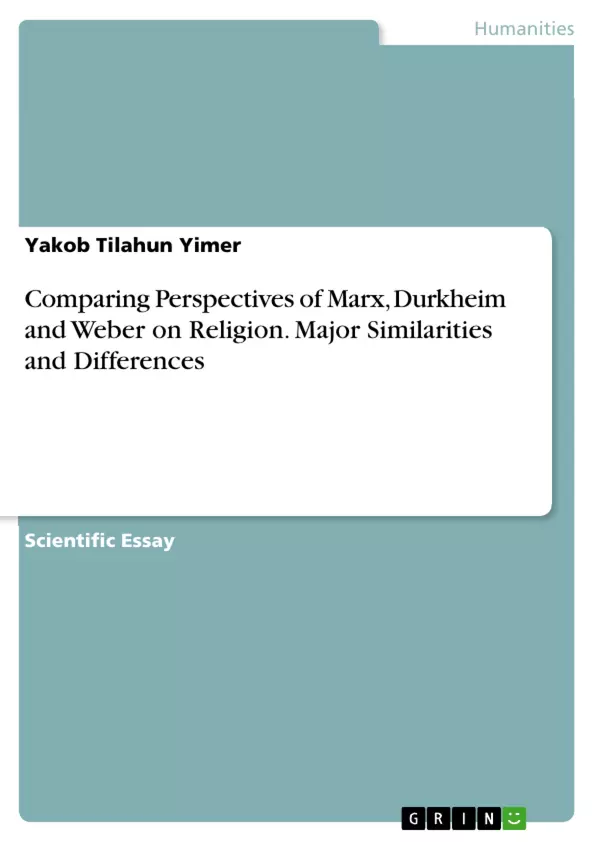This essay is trying to shortly put forward major similarities and differences of the theories of Marx, Durkheim, and Weber in the formation and application of religion as an instrument to human life and the contributions it facilitates to the existence and survival of societies in general. Above all the attempts to scientifically theorizing religious institutions within a sociological paradigm is the major contribution of the then social thinkers, and that fact will be highlighted shortly in the next few pages of the essay. Religion is the most persistent, social institution to pass and adjust itself in the position of the ages and its power is still controlling the activities of the world by one or the other way round. It is not all the fabric that led to the continuity of religion as an institution, but also the conducive environment of interpreting what the dogmas of different religions and their effects is still a controversial issue. The prominent social theorists utterly attainted their discourse on religion side by side with other social issues. The concern of different interpretations relied on the fact that the role and impact of religious thoughts had been shaping the world outlook. Thus, in the complicated sense what was asserted in relation to religion is still an important observation and the need for its narration is as important as it was before.
Inhaltsverzeichnis (Table of Contents)
- Introduction
- The major similarities of of Marx, Durkheim and Weber in relation to religion and its discourse
- Differences of Views Regarding Religion by Marx, Weber and Durkheim
- Conclusion
Zielsetzung und Themenschwerpunkte (Objectives and Key Themes)
This essay explores the similarities and differences between Marx, Durkheim, and Weber's perspectives on religion. It aims to understand how these influential social theorists viewed religion's role in shaping social life, economic activity, and human consciousness.
- The role of religion in shaping social structures and institutions.
- The influence of economic factors on religious beliefs and practices.
- The relationship between religion and the development of capitalist societies.
- The impact of religious ideologies on individual and collective consciousness.
- The potential for religion to both foster social cohesion and contribute to social fragmentation.
Zusammenfassung der Kapitel (Chapter Summaries)
- Introduction: This chapter introduces the topic of religion as a social institution and its enduring influence on human society. It highlights the need to understand different interpretations of religion and its impact on worldviews and historical epochs. The chapter establishes the importance of sociological perspectives on religion, focusing on the works of Marx, Durkheim, and Weber.
- The major similarities of of Marx, Durkheim and Weber in relation to religion and its discourse: This chapter explores commonalities in the views of Marx, Durkheim, and Weber regarding religion. It examines how these theorists saw religion as an element of social life and its connection to economic activities and historical developments.
Schlüsselwörter (Keywords)
The central keywords of this essay include religion, social institutions, capitalism, Marxism, Durkheimian sociology, Weberian sociology, social structures, economic activities, and consciousness. These terms encapsulate the primary focus of the text, which is to analyze the different perspectives of Marx, Durkheim, and Weber on the role of religion in shaping social life and economic development.
Frequently Asked Questions
What are the major similarities between Marx, Durkheim, and Weber regarding religion?
All three theorists viewed religion as a fundamental social institution that shapes individual consciousness and is deeply connected to historical and economic developments.
How did Karl Marx view the function of religion?
Marx famously viewed religion as an ideological tool that could justify social inequality and act as a form of social control, often described as the "opium of the people."
What was Emile Durkheim's focus in the sociology of religion?
Durkheim emphasized religion's role in fostering social cohesion and collective identity through shared rituals and the distinction between the sacred and the profane.
How did Max Weber connect religion to capitalism?
In his famous thesis, Weber argued that certain religious ethics, particularly in Protestantism, provided the cultural and psychological framework necessary for the rise of modern capitalism.
Why is the sociological study of religion still relevant today?
Religion remains a persistent force that shapes worldviews and social structures; understanding these classical theories helps analyze modern social fragmentation and cohesion.
- Citar trabajo
- Yakob Tilahun Yimer (Autor), 2018, Comparing Perspectives of Marx, Durkheim and Weber on Religion. Major Similarities and Differences, Múnich, GRIN Verlag, https://www.grin.com/document/492797



